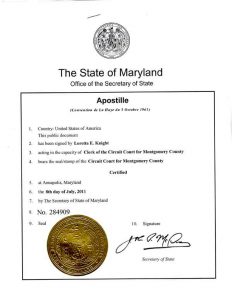An Apostille is the accepted form of Attestation required to acknowledge the validity of the foreign documents. The Apostille stamp approves the authority of the signer, in which he or she acted , not the content of the document.
Apostille is pronounced as a·pos·tille \ə-päs-’til\
The term “Apostille” is a French word, which means “to certify”, was first suggested by the signatory countries to the Apostille Treaty Hague Treaty 1961 to describe the accepted international form of authentication to legalize foreign public documents. The word is also pronounced “ Apostila” in Spanish.
The accepted Apostille attestation in the United States must contain fixed information in order for the document to be recognized abroad. Although every state issues different form of Apostille Stamp, However, each Apostille must contain this information regardless of the designated authority that issued the Apostille.

The Apostille Convention is an international treaty, held in the Netherlands on 1961, to abolish the requirements of foreign documents.
Each signatory country to the Apostille Convention designated a competent authority to affix the Apostille Certificate to public documents destined for use in one of the other Hague Treaty members.
The US government has assigned TWO different authorities to issue the Apostille attestation on documents destined for foreign use depending on the document type:-
The Local Secretary of State offices in all 50 states in the designated authority to issue the apostille attestation on public state documents such as:
It is the designated authority to issue the Apostile Stamp on documents issued by the federal Agencies in the United States such as:
Since 1961, many countries have ratified the Apostille treaty to abolish document legalization procedure of foreign public documents. Here is a list of the countries that accept the Apostille form as an evidence of the document’s authenticity: